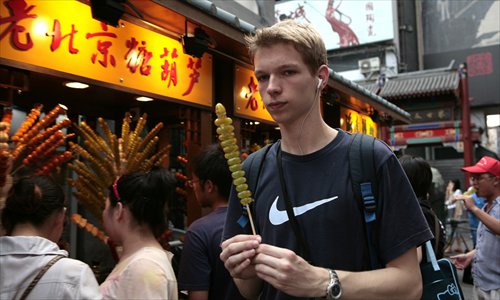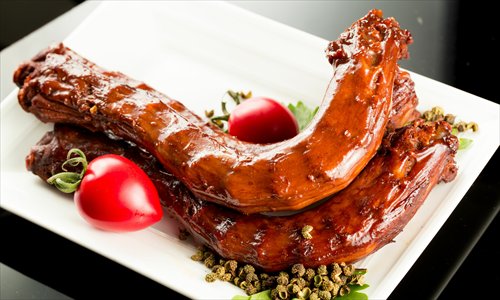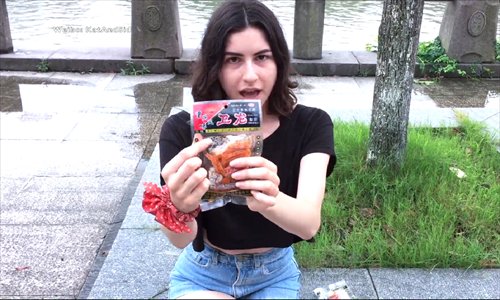Expats in China are drawn to the customs and cultural togetherness brought about by Chinese munchies

Love for Chinese snacks grows abroad. Photo: CFP
Micah Sockwell was munching on an ice cream inside a Dairy Queen in Beijing when his Chinese friends proffered a local snack. He could not see it clearly through its wrapper, but what he saw was not very enticing.
"It looked a little messy, like something I would not be very willing to try," said Sockwell.
His friends insisted, and he eventually gave in. He had only recently arrived in China, so he did not quite catch all of what they said, but it was obvious that they were not going to let up until he had a taste.
"I only realized the snack was spicy duck neck after eating it," Sockwell said. "The taste was unforgettable. It was so spicy that I ate the ice cream to counteract the heat."
His friends laughed. Not only was he comically mixing Chinese and American flavors to tame the heat, but he failed to get any of the juicy meat off the duck neck. Still, Sockwell found the spicy duck neck hard to resist; he tried another one.
A kindergarten English teacher in Changping district, Sockwell, a 30-year-old American, has been in Beijing for two years, during which time he has gained an affinity for Chinese food and snacks. Not only have they become a part of his daily diet but he has also incorporated the snacks into his classes. He uses them to communicate with children by sharing the delicious snacks he found.
Sockwell has become accustomed to spicy food and is quite adept at eating snacks like duck neck. "Now, I can just stick the whole neck in my mouth and suck the meat off like I do with chicken wings."
Local Chinese snacks have become popular among many expats in China, and even some foreigners overseas have started to try them. For them, trying different Chinese snacks is a delicious and exciting way to understand the different local tastes and cultures all over the country.

Foreigners wait for chuar on the street side. Photo: IC

Spicy duck necks, a popular Chinese snack Photo: IC

American Kat tries latiao, a popular Chinese snack, in her "KatAndRid" video. Photo: Courtesy of Kat
Latiao following grows abroad
Kat, a New York University student in her 20s, recently fell in love with the Chinese snack latiao (spicy chips) during her vacation in China with her Chinese boyfriend.
She even made a video about her first attempt at eating the popular Chinese snack, saying she was surprised that it tasted so good despite its simple packaging.
In the video, she said she expected latiao be very spicy like other Chinese snacks she had. She was shocked that it was sweet, and even more astonished at its affordable price. "It is amazing because you can't buy anything with eight cents in the US," she said in the video.
The video was viewed over 10,000 times within three weeks and attracted around 100 comments on bilibili.com, a popular video-sharing site in China. Many viewers were astonished that foreigners also like to eat latiao.
Kat is returning to the US soon. She plans to take latiao back to share with her family and friends.
Actually, latiao has already gained its international foodie fan base. On its page on US-based shopping sites ebay.com and amazon.com, latiao receives a lot of praise.
An Amazon customer named Brianna Lee gave it five stars and commented that, "[Latiao is] spicy hot and tastes real good. Great substitute for meat and better for you! The price is very cheap."
Although it is popular, some foreigners are skeptical about the packaging of some Chinese snacks, while others are more concerned about the ingredients and food safety.
"Latiao is tasty, but dirty," said Austin Guidry, a blogger and vlogger (video blogger) who moved to China from the US five years ago. He enjoys trying different kinds of snacks but worries about the quality.
"People heard much news about the irregular food processing in some factories. There are always food scandals happening somewhere in China, which creates a bad image not only in China but also abroad," he said, adding that the scandals hinder the promotion of Chinese snacks overseas.
Special ingredients require skill
There are some Chinese snacks that foreigners may be hesitant about eating, such as animal claws.
Kat enjoyed many local snacks but found chicken feet quite hard to accept.
"I like the flavor, but it definitely feels weird to eat it because of the texture and the bones in it," said Kat.
She said most Americans prefer more processed food with the bones taken out.
Sockwell said the difference between American food and Chinese cuisine is that some Chinese snacks require special skills to eat. He said they also eat sunflower seeds in his hometown back in the US, only they eat them in a totally different way.
"Instead of cracking it like Chinese people, we suck the flavor out of it. We usually just put a bunch in our mouth and suck on them and spit out the shells."
He feels the difference more keenly when having duck neck and chicken feet.
"It's a lot of work for so little meat, but it is also where the interest lies," he said.
Sockwell thinks that some foreigners hesitate or refuse to try Chinese snacks because they might feel more comfortable sticking to their habits. He said he has always tried anything put in front of him "at least once." For example, he tried larvae and scorpion under the recommendation of his friends in China.
As for Guidry, ingredients like chicken claws is one of the most amazing parts of the Chinese food and snack experience.
"The Chinese have created a lot of dishes that only people truly hungry would have thought to be edible. Now, those dishes have been modified and made into popular culture," he said.
Various local tastes
In Sockwell's opinion, Chinese snacks can also promote social gatherings and cultural exchange.
He said that spicy duck necks are more enjoyable in a group setting. He enjoys gathering with friends on a Friday night after a long week of work or after a basketball game.
"There's something special about wearing plastic gloves, sucking on duck necks, and drowning it down with beer while gossiping with friends," he said.
Gathering to snack on local food also gives him a special taste of Beijing.
"I like going to food streets like Nanluoguxiang with friends - a cultural must for anyone coming to Beijing - or eating late-night chuar or duck neck with beer," he said. "You really won't experience stuff like that elsewhere."
Guidry, who teaches at Southwestern University of Finance and Economics in Chengdu, Sichuan Province, enjoys the various kinds of local snacks sold on the streets of Chengdu.
His favorite is beef guokui, a bread-like dough mixed with ground meat and spices that are deep fried and can be eaten while walking.
"It tastes like victory. I love eating and walking, so I love anything that can be held and eaten while walking!" he said.
Guidry makes videos about Chinese food to show people back home what Chinese food is like. He has 11,600 subscribers on Youtube.
"You'd be hard pressed to find a nation's cuisine as diverse as China's. There are eight major schools of cooking, plus local specialties in every single city, large and small," said Guidry.
Eating around China is his own way of understanding the country. "There are all kinds of crazy wonderful things that I have tried, and there is a whole lifetime of eating ahead!"
Newspaper headline: Snackalicious